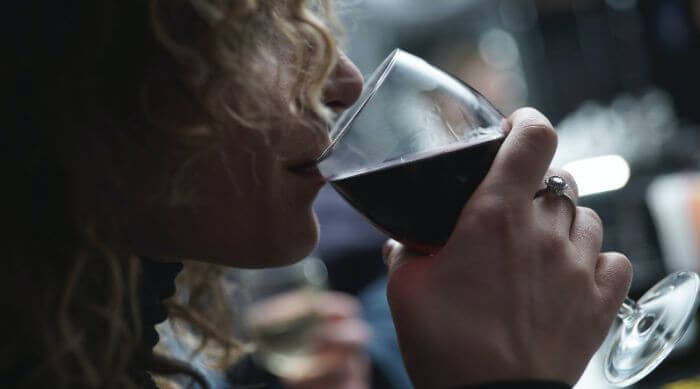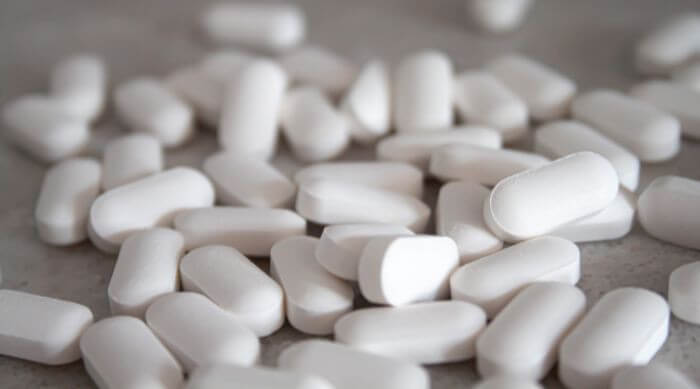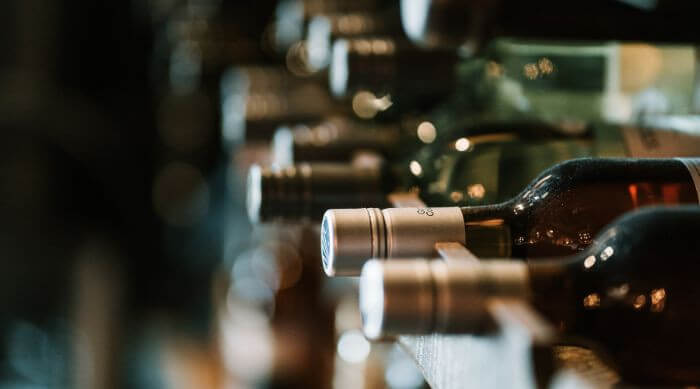Wine can make you bloated just like any other alcohol. Some of that is weight gain from empty calories, but it’s also how alcohol affects your gut.
We’ll start with why alcohol doesn’t always mix with good gut health before we move on to how you can beat belly bloat from drinking for good.
Table of Contents
How Alcohol Affects the Digestive System
Do all alcoholic beverages cause bloating?
How long does alcohol bloating last?
8 Ways to Prevent Alcohol Bloating
How Alcohol Affects the Digestive System
If your morning-after hangovers include unpleasant gastro effects, you already know that alcohol can wreak havoc on your digestive system. Stomach bloating specifically is linked to a variety of causes.
What causes bloating after drinking alcohol? Excess calories, irritation of your stomach lining, and dehydration are all causes of bloating after drinking alcohol.
Empty calories
All calories from alcohol are considered empty calories. They don’t offer nutritional value in the long-term, despite what you’ve read about drinking wine for health.
The more you drink, the more empty calories you add to your daily diet. That can lead to weight gain over time and a “beer belly” even if beer isn’t your drink of choice.
Inflammation
Alcohol has inflammatory effects on your stomach lining. That can mess with your gut’s microbiome and the balance of good vs. bad bacteria in your stomach. Over time, inflammation can turn into chronic indigestion, abdominal pain, and gastritis.
Dehydration
Alcohol is a diuretic, which means it causes your body to produce more urine. This isn’t “breaking the seal,” by the way. While it may feel like you have to hit the bathroom more often after that first trip, your body is just catching up with the alcohol you’ve consumed.
More urination means more fluid loss, which can leave you dehydrated at the end of the night. That can also mean water retention and belly bloat the morning after.
Pre-existing conditions
Alcohol can worsen pre-existing conditions like irritable bowel syndrome (IBS), inflammatory bowel disease (IBD), and gastroesophageal reflux disease (GERD), or acid reflux. It can worsen symptoms of heartburn by increasing stomach acid.
If you’re already dealing with these conditions, it’s best to limit your drinking to beverages with lower acidity or skip alcohol altogether.
It’s Not Just a “Beer Belly”
Besides the belly bloat you’re dealing with from those excess calories and gastro effects, alcohol consumption can also dry out your skin. The result can mean itchy, irritated skin and facial puffiness, especially under your eyes.
The best way to bring down that puffiness isn’t a day at the spa. It’s getting your body rehydrated and reducing your alcohol intake the next time around.
Do all alcoholic beverages cause bloating?
All alcoholic beverages have the potential to cause bloating, but there are some types of alcohol that are better than others when it comes to belly bloat.
What can you drink that won't make you bloated? You can drink dry red wines and clear spirits like vodka and gin if you want to avoid alcohol that typically makes you bloated.
That said, you may notice digestive effects anyway. An alcohol alternative like Surely wine is a safer bet if your gut is sensitive to any amount of alcohol.
How long does alcohol bloating last?
How long alcohol bloating lasts for you depends on the cause. If you’re dealing with weight gain or health conditions from heavy drinking, it could take a few weeks or months after cutting back to see positive effects.
It can also depend on how much you had to drink. It takes alcohol some time to move through your system.
Temporary bloating from alcohol could resolve itself within a day or 2, especially if you take steps to remedy the effects of alcohol on your body.
How to Treat Alcohol Bloating
How do you get rid of wine bloat? To get rid of wine bloat, drink water before, during, and after that glass of wine, avoid sparkling options, and switch to non-alcoholic alternatives, for starters.
That advice holds true for beer vs. wine and any other alcoholic beverages.
Prevention is best if you’re prone to alcohol bloating, but here are some ways to improve your symptoms if you’ve had one too many alcoholic drinks.
Water. Belly bloat is worse when you’re dehydrated, so drink plenty of water if you’re already dealing with discomfort after drinking.
Physical activity. A short walk could get your bowels moving — we recommend a solo jaunt if you’re feeling gassy.
A healthy meal. Go for lean proteins for starters. Introduce fiber and probiotics for a healthy gut microbiome once things have settled.
Antacids. Over-the-counter meds that neutralize your stomach acids or provide some gas relief may help you feel better faster.
Herbal remedies. Ginger and turmeric have anti-inflammatory effects that may reduce gas and intestinal distress.
Talk to your doctor. If you’re dealing with abdominal pain or other digestive tract symptoms that won’t go away, these could be signs of an underlying condition. It may be time to seek medical advice.
8 Ways to Prevent Alcohol Bloating
Let’s dig into some prevention tips to keep belly bloat at bay.
1. Drink water…lots of it.
Drinking water is the best way to reduce dehydration and inflammation from alcohol. It also has the side benefit of slowing you down if you incorporate a glass of water in between each alcoholic beverage.
Drink plenty of plain water before, during, and after a night of drinking to not only reduce your risk of belly bloat, but improve your chances of avoiding a bad hangover the next morning.
2. Slow down.
Drinking too fast doesn’t just get you drunk faster. It increases the amount of air you consume. More air in the body means more gas and the potential for belly bloat. Slowing down your drinking and eating habits is good for overall digestion, too.
Note: Smoking can increase the amount of air you take in. If you’re serious about beating belly bloat, you should be serious about quitting smoking, especially while you drink.
3. Skip carbonated mixers.
Carbonation affects alcohol absorption and potentially gets you tipsy faster. It can also make you feel more gassy. You’re swallowing more air and carbon dioxide when you sip on sparkling wines, soda-based mixed drinks, and most beers.
That means temporary bloating and an uncomfortable feeling of fullness in your belly.
4. Skip sugary drinks.
If it seems like your belly bloat is worse after a round of super sweet mixed drinks, you could be sensitive to sugars and carbohydrates. If you’re a wine fan, look for dry wines with lower amounts of residual sugar that won’t mess with your blood sugar or your gut.
5. Watch what you eat.
Salty or sugary foods, dairy, and certain carbs can all cause excess gas and constipation, the perfect combo for belly bloat. Healthy fats, lean proteins, and foods rich in nutrients like potassium are all great if you want to avoid inflammation.
Probiotics and fiber are great dietary choices in the long-term, but avoid them when you’re in the middle of battling belly bloat. Both can make you gassy. Include them in your diet once you’re feeling better to boost your digestive enzymes and balance your gut.
6. Address chronic stress.
Everything in the body is connected. Chronic stress can exacerbate gut issues like IBS and stomach ulcers. Even if your digestion is pretty solid, stress can cause temporary issues like constipation and diarrhea that contribute to bloat.
Adding alcohol into the mix doesn’t help your stress or mental health. Alcohol is a depressant that can mess with your brain chemistry over time. Boost that gut-brain connection with better options for stress relief like yoga, a fun new hobby, or a playdate that doesn’t involve alcohol.
7. Treat your gut issues.
If it seems like your gut issues go beyond bloating from alcohol, it may be time to talk to your doctor. There could be an underlying health condition that you can’t address by cutting back on alcohol alone. You may need to make bigger changes to your diet or start a medication regimen.
8. Drink less alcohol.
This one seems like a no-brainer, but the more you drink, the more likely you are to experience bloating from alcohol. Drink less and you won’t have to worry about stocking up on antacids or watching your snacks as closely.
You can also skip alcohol altogether.
Ditch the Side Effects with Non-Alcoholic Wine
Belly bloat can hit even the casual drinker, but you don’t have to suffer through gut discomfort if you don’t want to. Choose a non-alcoholic wine and ditch stomach bloating for good.
Surely wine is a low-calorie, zero-alcohol option that’s still full of flavor. If you’re watching your fizz, try our non-alcoholic sauvignon blanc. Our white wine is bright, crisp, and citrus-forward.
A Word of Caution
Temporary inflammation from a night of drinking typically goes away on its own. Heavy drinking can cause conditions like chronic gastritis, a more severe form of inflammation along your stomach lining.
Chronic inflammation is more than uncomfortable. It can make it hard for your body to absorb the nutrients it needs, even if you’re on a healthy diet otherwise. Excessive drinking can also put you at risk for peptic ulcers and related cancers like colon cancer.
These serious effects are more common in those struggling with alcohol abuse and addiction. If you’re in need of alcoholic addiction treatment, start with these resources:
Sources
- Alcohol, inflammation, and gut-liver-brain interactions in tissue damage and disease development
- Gastritis in the alcoholic: relationship to gastric alcohol metabolism and Helicobacter pylori
- Alcohol consumption and risk of colon cancer: evidence from the national health and nutrition examination survey I epidemiologic follow-up study
- The Diuretic Action of Weak and Strong Alcoholic Beverages in Elderly Men: A Randomized Diet-Controlled Crossover Trial
- Alcohol and gastric acid secretion in humans
- Impact of Smoking and Alcohol Use on Facial Aging in Women: Results of a Large Multinational, Multiracial, Cross-sectional Survey
- Food Components and Dietary Habits: Keys for a Healthy Gut Microbiota Composition
- Synergistic Anti-Inflammatory Activity of Ginger and Turmeric Extracts in Inhibiting Lipopolysaccharide and Interferon-γ-Induced Proinflammatory Mediators




